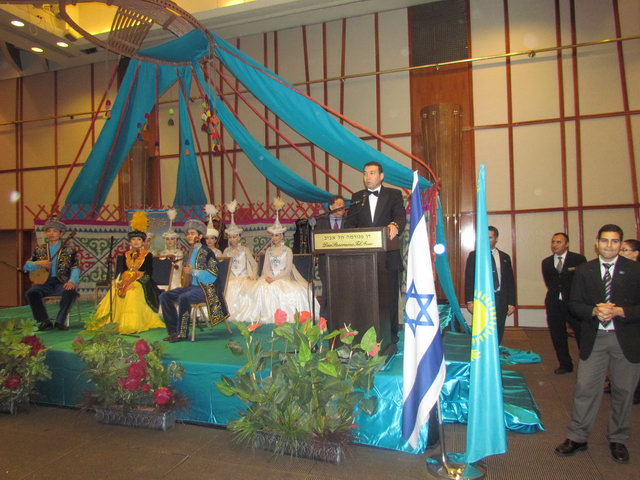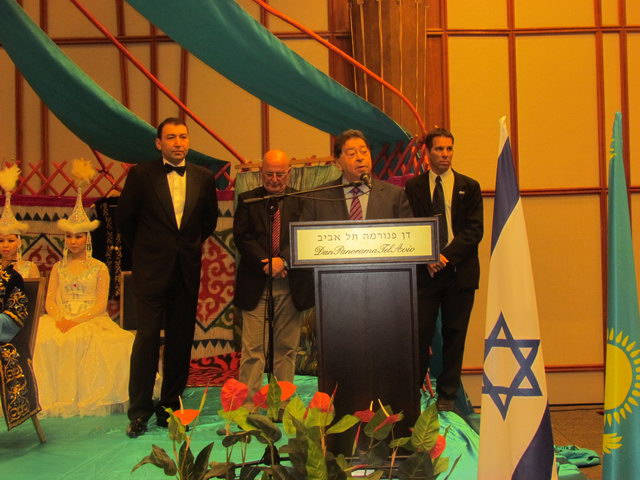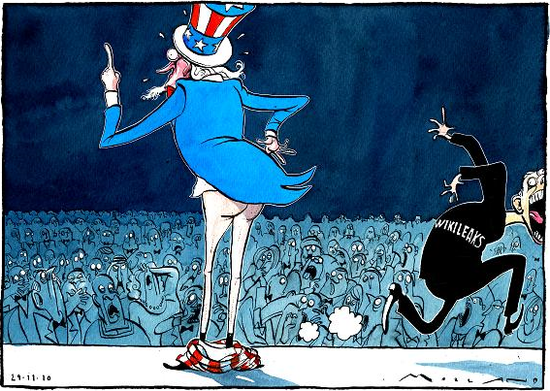- Details
- Written by Diplomacy
The Embassy of Kazakhstan in Tel Aviv celebrated and rejoiced in commemorating the 19th anniversary of its nation's independence in what could only be defined as the finest and classiest Kazakhi style.

A large contingent of foreign dignitaries, Israeli MK's and representatives of the Foreign Ministry attended the lavish gala which was accompanied by traditional Kazakhi styles and cultural elements. Amongst the notable guests, Minister of Industry, Labor and Trade, Binyamin (Fuoad) Ben Eliezer and MK Yossi Peled gave encouraging speeches honoring the Central Asian Nation.
H.E. Galym Orazbakov, Kazakhstan's ambassador to Tel Aviv gave a moving speech as he discussed the natural bond between his country and Israel. Mr. Orazbakov spoke of the warm and fortified diplomatic relations between the State of Israel and Kazakhstan as he explained that "since 1992, the relations have become more understanding and stronger."
Israel was one of the very first countries to recognize the independence of the Republic of Kazakhstan in 1991, and since then, the two countries have always maintained a solid and amicable friendship.
Kazakhi-Israeli relations have been categorized across many sectors: political, scientific, humanitarian, military-technical and economic. Trade and economic relations between the countries has increased heavily over the past few years.
 The Ambassador described how trade started as virtually nothing but has reached, '250 million US dollars in 2008, as more than 250 Israeli companies are now doing business in Kazakhstan,' - more than double in comparison with the previous year.
The Ambassador described how trade started as virtually nothing but has reached, '250 million US dollars in 2008, as more than 250 Israeli companies are now doing business in Kazakhstan,' - more than double in comparison with the previous year.
Kazakhstan and Israel successfully sustain relations beyond the business and economic sphere as well.
Mr. Orazbakov highlighted and made his admirations known with regards to the current special exhibition at the Menachem Begin Heritage Center in Jerusalem, which ends on the 24th of December. He noted pridefully that the exhibition contains works of Kazakh artist, Erbolat Tolepbay.
Later on into the evening, Mr. Ben Eliezer spoke about his visit to Kazakhstan and his meetings with government officials and heads of the business sector.
"Those meetings have created the foundations for continued joint work between our two countries and help in achieving closer and better economic ties."
He concluded his speech by wishing Kazakhstan a happy independence day.

The eventful evening also featured traditional, delicious Kazakhi food, music and women beautifully dressed in typical and exotic Kazakhi attire.
Clearly, those in attendance were inspired by the rich cultural traditions on display as well as being encouraged by the direction of Israeli-Kazakhi relations headed into 2011.
For more information on Kazakhstan's diplomatic mission to Tel Aviv, click here
Photos Silvia Golan
- Details
- Written by Steve Rubin
With every news agency across the world commenting on the WikiLeaks phenomena, diplomacy.co.il could not let the opportunity to offer its own perspectives slip by. Mind you, our main objective is to facilitate more effective communication amongst the diplomatic and business community; however, as we are a site dedicated to the diplomatic world - in Israel and abroad - there is no way we could not give our own commentary on what is definitely the biggest security and diplomatic fiasco over the last century.
In a nutshell, what do these documents portray: cunning and astute bargaining amongst diplomats and heads of states; assessments of terror and nuclear threats; surprising statements by world leaders; quirky wry humor amongst security officials?
Besides giving a more profound look into the Iranian regime's internal conflict and its nuclear development, nothing we did not already know was released.
Skimming through newspapers worldwide, anyone can - on a daily basis - find lengthy articles regarding the wishes of Arab leaders to see the complete destruction of Iran's nuclear program, even if a military strike is the sole way in achieving this goal. Already back in June, reports were published regarding comments by the U.A.E Ambassador to the United States in which he advocated a US strike on Iranian nuclear facilities.
"I am willing to absorb what takes place at the expense of the security of the U.A.E," he said, referring to the possible destruction and consequences posed by a military strike (for the full audio-interview conducted by the Atlantic's Jeffrey Goldberg, click here).
When an ambassador expresses such issues as related to security and defense, it can only be assumed that those statements are nothing short of the official stance taken by his or her government - be it a monarchy or a thriving democracy.
Are people really surprised that the United States is responsible for the armament of Yemeni forces in their fight against rebel groups providing refuge to thousands of al-Qaeda and Islamist operatives while vying for control of Yemen?
Are the different Israeli assessments regarding an effective timeline for a strike on Iran's nuclear facilities something new to us? Isn't there something in the press every five minutes about this?
Is anyone shocked that the US and Pakistan are feuding over that country's internal policies as applies to the War in Afghanistan as well as Pakistan's fragile and unprotected nuclear arsenal? What WOULD BE shocking is if the WikiLeaks reports were to reveal a trusting, mutually beneficial relationship between the two!
For understanding the complicated trickery and deceit inherent in Middle East politics, one does not have to jump on leaked information regarding the US State Departments inner workings within the region. Simply living here is enough to make anyone realize that shifting alliances are nothing more than a way to shape foreign policy on a day to day basis.
The alliances of today will most likely be gone tomorrow.
Besides making for a great novel turned Hollywood feature, the release of the WikiLeaks documents only expands on reports that have been circulating for years.
Embarrassing? Yes. Enough to restructure the world political divide? Not a bit.
For more in depth coverage of the WikiLeaks saga, visit http://www.haaretz.com or http://www.nytimes.com









